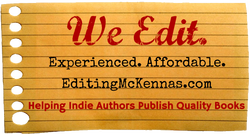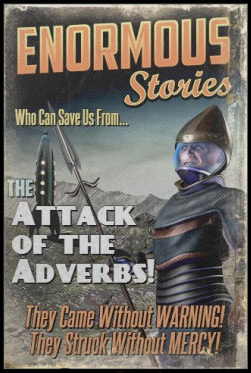 They've come for your verbs. Kill them.
They've come for your verbs. Kill them. Attack of the Adverbs!
My former students and editing clients probably won’t believe I said this, but an adverb is a useful and necessary part of speech. It does a job. It just doesn’t do the job a lot of writers seem to think it does—that of somehow making up for having chosen a flabby verb.
Adverbs modify verbs or adjectives. That's their job. When used wisely and in moderation, they help convey meaning, and they can improve a non-specific sort of verb by giving the reader more information.
Adverbs modifying verbs
Bob read voraciously in all genres.
Jax placed the eggs carefully into the basket.
Adverbs modifying adjectives
Merkel’s frostily pale eyes scanned the restaurant.
“Lightly sautéed works best for mushrooms,” Bashir assured her.
That said, when a strong, specific verb is called for, an adverb is not.
 She TOLD you to use stronger, more specific verbs!
She TOLD you to use stronger, more specific verbs! “Sprinted” is stronger than “ran quickly,” “smashed” tells us more than “hit hard,” “shrieked” is more evocative than “cried loudly.” You get the idea. A good verb shows rather than tells, strengthening—and tightening—the sentence while conveying maximum information and emotion to the reader.
Adverbs modifying adjectives are usually far less of a problem in writing. If you have a tendency to overuse them, you’ll soon figure it out when you search your manuscript for “ly.” While you’re at it, you’ll probably find a lot of verb-modifying adverbs that wormed their way into your sentences without you having been aware of them. Kill them and rewrite to favor good healthy verbs.
Not all adverbs end in “-ly,” but many do. It’s a good place to start when searching your manuscript.
 Keep saying "very," and I'll make you deal with them.
Keep saying "very," and I'll make you deal with them. A good adjective can walk on its own two legs most of the time, or it can partner with another adjective or a more meaningful adverb to further describe the noun in question. Or you can just back up and re-describe the noun in other terms.
“Very” can almost always be cut from narrative as well as most dialogue. See also “absolutely, definitely, mostly, simply, really, totally, terribly, utterly,” and any word, really, that stands in the way of a simple, well-chosen modifier trying to do its job.
“A very tall man” is rarely as good as...
...a tall, slender man (two adjectives doing their job without the intervention of an adverb).
...a freakishly tall man (an adverb doing yeoman duty. Well done, adverb!).
...a man so tall his head threatened the door lintel (bringing the POV character’s reaction into play).
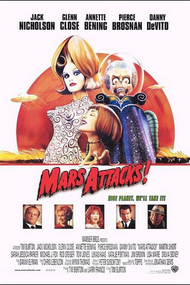 Terribly, totally, utterly vile Martians want your brain.
Terribly, totally, utterly vile Martians want your brain. She looked up and up and up, and the man just kept on going.
“Very” is not only sneaky, it’s lazy. There’s almost always another word that will do more work for the same pay.
TL;DR
How many of your verbs are weaklings hoping in vain for help from an adverb? How many are already perfectly good verbs that can stand on their own without an adverb?
How many times have you used these and similar words?
Very, Absolutely, Definitely, Mostly, Simply, Really, Totally, Terribly, Completely, Utterly...
- Search for “ly.”
- Eliminate unnecessary adverbs.
- Replace weak verbs with strong, specific ones that convey more meaning.
COVER ART
All the fabulous pulp magazine covers on this article series were created using the amazing Pulp-O-Mizer from art by its creator, Bradley W. Schenck.

Thanks for linking to this blog!
Joel Friedman's Self-Publishing Carnival of the Indies
A Novel Experience - Best of the Week's Articles
Did I miss anyone? Let me know!
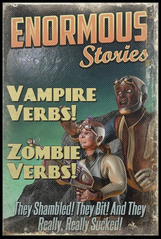
Part 2: Vampire Verbs, Zombie Verbs, and Verbs that Kick Ass
Part 4: The Weakeners
Part 5: When Words Get in the Way
Part 6: Secrets of Relative Velocity
Part 7: Two Languages
Part 8: Dialogue Tags
Part 9: Dangling Modifiers
Part 10: Passive Voice
Part 11: Homophones
Part 12: Point of View Violations












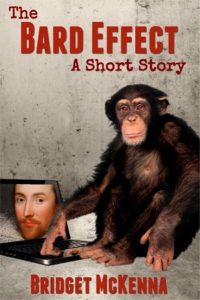
 RSS Feed
RSS Feed

